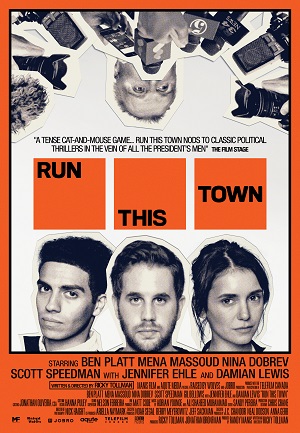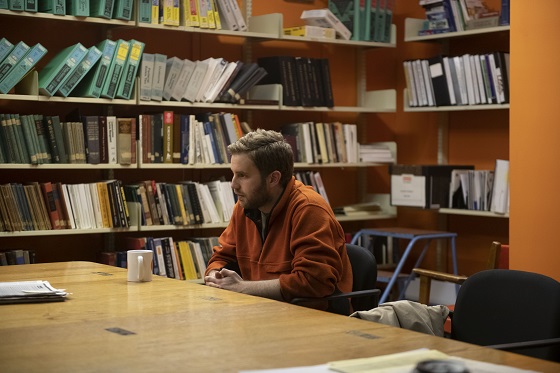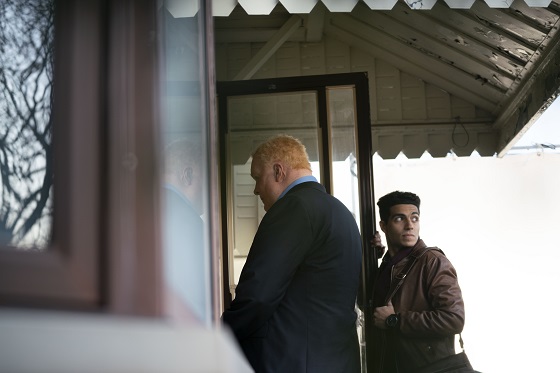

[Rating: Swiss Fist]
An ambitious yet overstuffed political thriller with about two B-plots too many, Run This Town dances around the edges of a very interesting story, yet has trouble assembling its disparate pieces into a cohesive narrative that serves the whole. And this is too bad, because these characters are well drawn and live in a world that is both fleshed out and true to the setting. Yet writer/director Ricky Tollman never manages to get any of his competing narrative threads to work in concert with each other to reveal a greater truth or idea, and instead builds towards a conclusion that manages to let down all the competing storylines and the characters meant to serve it.
Set in 2013 Toronto, Run This Town opens with the staff of Mayor Rob Ford (Damian Lewis) walking through the intricacies of upcoming legislation that paints them less as aides, and more as the drivers of policy. Indeed, this is proven to be the case when the audience meets Kamal (Mena Massoud), who is Special Assistant to the Mayor and acts as a one-man crisis management team. Mayor Ford has the outward appearance of a political everyman, as he personally returns the calls of his constituents and even goes door-to-door to meet them in-person at times, yet the man is a walking, talking, alcoholic, crack smoking, #MeToo mess. When allegations about sexual misconduct and a possible video of the mayor smoking crack emerge, Kamal must decide whether to jump ship or perform yet another spin miracle.
Running parallel to this story is another about recent college grad Bram (Ben Platt), who manages to get a job with a Toronto newspaper right out of school, yet is disheartened to learn that his work is less Woodward and Bernstein, and more Reddit and Buzzfeed. After more than a year at his post, Bram struggles to reconcile his professional aspirations with the ‘Top 10 Best Toronto Hot Dogs’ work he’s doing, and is only saved when he’s thrown a lifeline by a random tipster with a hot lead on Mayor Ford. Bram’s bosses at the paper don’t have much faith in the story, and don’t trust him to handle whatever may be there, yet the young journalist is determined to take advantage of his first ever “break.”

On the face of it, this seems like a decent enough set-up, as the film has the potential to unspool a real-life scandal from both the outside and within, yet these narratives fail to merge and largely run parallel to each other throughout Run This Town. There’s no overarching thematic framework to tie the two stories together outside of the fact that both involve the same conflict (the mayor’s crack video scandal). In other words, the movie has no reason to tell this story from two different directions, and while both are interesting in their own way, neither makes the other more thematically relevant or complete. And while Kamal and Bram are both at a professional crossroads due to the events, it is for different reasons (Bram because his industry isn’t what he thought it was, and Kamal because the man he’s working for is a train wreck of a human).
Even so, while the script consistently fails the overall effort, the actors never do. Massoud and Platt are both spectacular in the lead roles and keep the audience both interested and invested in their respective journeys. Both come across as complete, realized characters that exist as more than just dialogue fodder for the plot that each carries, and are written in such a way as to provide some perspective on the evolution of their fields circa 2013. For Kamal, it’s all about spin and attacking when his predecessors might have defended; for Bram, it’s learning the harsh truths about the vanishing presence of traditional journalism in an age when every publication is just chasing clicks. This side of the effort comes across as well-written, yet even this is often a double-edged sword, as the movie doesn’t seem to know how or when to pull back or economize what it wants to say, eloquent though it may be.

Indeed, the writing feels a bit forced, and while clever and crackling with a genuine acoustic, it often serves little except as a showcase for the scribe’s dialogue talents. The film’s opening scene with Kamal and his colleagues sparring over civic semantics for the better part of five minutes sets the stage for much of this, and is a harbinger for the screenwriting push-ups put on display throughout Run This Town. Nothing about this scene is particular necessary, and while it does provide some context for the work Mayor Ford’s team does in the wings, the rest of their scenes accomplish this with the same effect, and don’t have the added disadvantage of confusing the hell out of the audience right off the bat.
The result is a movie that feels like it has all the right pieces, players, and even dialogue, yet has an incomplete set of instructions on how to assemble all of it. There are just too many balls in the air, here. There’s even another plot thread about a local cop (Shawshank alum Gil Bellows) piecing together evidence from the scraps of Bram and Kamal’s work that goes nowhere, and only further strains the capabilities of a film with one too many ideas as it is. Interesting, yet with so much to say that it fails to say much of anything at all, the effort sadly collapses before hitting the finish line, proving that rookie filmmaker Ricky Tollman should have learned to walk before attempting to Run This Town.





Comments on this entry are closed.